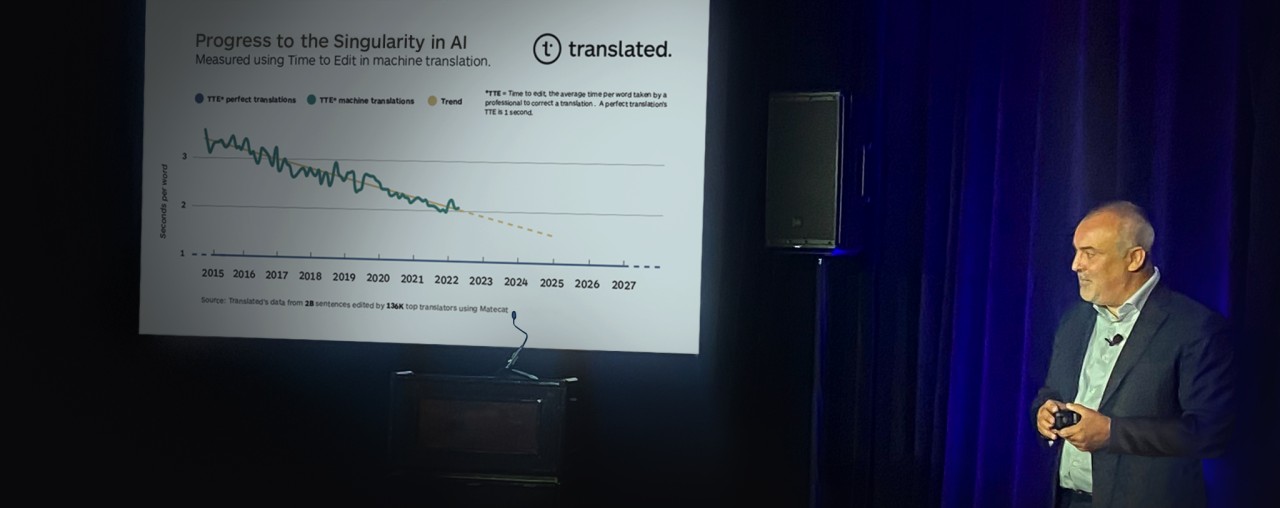Singularity in AI is coming says the Italian company Translated
The moment when a machine will prove to be more intelligent than human being is behind the corner.

For the first time in history, an Italian company would have been able to quantify the speed with which the progress of artificial intelligence approaches the singularity. Which is the moment when machines will do intelligent operations better than a human being. The company, Translated Srl explain the result in the Association for Machine Translation in the Americas 2022 conference.
Translate Srl deals with translations done with machine learning since 1999, and at the Conference of Association for Machine Translation in Orlando, its managing director Marco Trombetti has identified the date when an artificial intelligence will be able to make better translations than human ones: 2027. One day of that year, in five years, a machine will be able to translate a text better than a human, in the same amount of time.
What is the singularity of Artificial Intelligence
The concept of singularity is one of the most debated and fascinating of the new technological frontiers. It was the British mathematician Irving Good in 1965 who formulated it for the first time, when he imagined that with technological progress we would come close to a point where there would be the advent of superior intelligence.
But it is only in more recent times that discussions have begun on the times, implications and risks of an event of this type. Thanks to the acceleration of technology, computer scientists, essayists, mathematicians have begun to wonder when a machine will prove to be more intelligent than man. By mid-century, the US computer scientist Raymond Kurzweil with Nick Bostrom had announced 2045 before and 2038 after. But someone like the philosopher Luciano Floridi argue that it is not possible to predict the exponential growth of something indefinitely. Including the progress of machine learning.
What Translated’s data demonstrates
Translated Srl achieved its ‘2027’ premonition by analyzing the data of 2 billion translations made in 11 years. This would be the first date obtained not by intuition, but by mathematical calculation. Translated translates texts with machine learning machines: a program translates, a human corrector revises the text and machine corrects any expressions in relation to the context of the sentence.
An example: a machine can translate "Io amo Roma" as “i love rome” o “I love Rome”. In relation to the context, “love” can take on different shades of meaning. When the human proofreader tells the machine the best translation in relation to the context, the machine learns. And he tends not to make the same mistake again.
Trombetti notice that the margin of error of a translation is getting sharper. And in 2027 a machine will provide a translation that humans will correct only the minimum necessary, when it would be useful for a translation checker to modify the text translated by another human. And then keep getting better and better.
Why AI applied to translations matters
Translation is considered by artificial intelligence experts to be the most complicated sector for a machine. Because behind a sentence there is an understanding of the context, of idioms, feelings, a number of variables such as to easily mislead a non-human intelligence. Language is a human creation. It carries with it all our history. That a machine can understand it in the same way as a human is a quantum leap. May he understand it even better than us, a scenario that is currently impossible to imagine.
Because after the singularity, assuming it is reached and that it is reached by 2027, the machines will continue to learn. They could continue to be increasingly effective. The effects on the different applications of AI systems (more or less all fields of human knowledge and skills) are difficult to predict. But for now, Translated Srl explains, at least human translators can breathe a sigh of relief. Their work will still be needed. At least in the care of translations.
Translated Srl estimates that achieving singularity in translation will lead to a tenfold increase in requests for professional translations. In addition, the demand for machine translation will increase 100 times. This estimate is based on the company’s observation of the growing demand for translation in an increasingly global world and awareness of the evolution of the quality of machine translation, which allows more content to be translated while reducing costs.
Related news
Last News
RSA at Cybertech Europe 2024
Alaa Abdul Nabi, Vice President, Sales International at RSA presents the innovations the vendor brings to Cybertech as part of a passwordless vision for…
Italian Security Awards 2024: G11 Media honours the best of Italian cybersecurity
G11 Media's SecurityOpenLab magazine rewards excellence in cybersecurity: the best vendors based on user votes
How Austria is making its AI ecosystem grow
Always keeping an European perspective, Austria has developed a thriving AI ecosystem that now can attract talents and companies from other countries
Sparkle and Telsy test Quantum Key Distribution in practice
Successfully completing a Proof of Concept implementation in Athens, the two Italian companies prove that QKD can be easily implemented also in pre-existing…
Most read
Integral AI Unveils World’s First AGI-capable Model
#AGI--Integral AI, a global leader in the development of embodied AGI, today announced the successful testing of the world’s first AGI-capable model.…
Reply Achieves the AWS Agentic AI Specialization and Is Named an Implementation…
Reply [EXM, STAR: REY] announced that it has achieved the Amazon Web Services (AWS) Agentic AI Specialization, a new category within the AWS AI Competency.…
Tecnotree Emerges as CX Catalyst Winner for Impact at The Fast Mode Awards…
Tecnotree, a global digital platform and services leader for AI, 5G, and cloud-native technologies, has won the CX Catalyst award for Impact at The Fast…
CoMotion GLOBAL 2025 Launches in Riyadh: Global Mobility Leaders Unite…
Riyadh is rapidly becoming one of the world's most ambitious urban mobility laboratories, where next-generation technologies move from blueprint to real-world…






